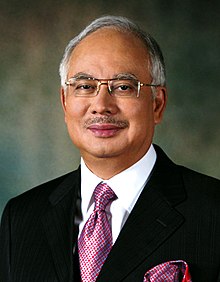Najib Tun Razak
|
Yang Amat Berhormat Dato' Sri Najib Razak MP |
|
|---|---|
 |
|
| 6th Prime Minister of Malaysia | |
|
Assumed office 3 April 2009 |
|
| Monarch |
Mizan Zainal Abidin Abdul Halim Muhammad V |
| Deputy |
Muhyiddin Yassin Ahmad Zahid Hamidi |
| Preceded by | Abdullah Ahmad Badawi |
| President of the United Malays National Organisation | |
|
Assumed office 26 March 2009 |
|
| Deputy | Ahmad Zahid Hamidi |
| Preceded by | Abdullah Ahmad Badawi |
| 9th Deputy Prime Minister of Malaysia | |
|
In office 7 January 2004 – 3 April 2009 |
|
| Prime Minister | Abdullah Ahmad Badawi |
| Preceded by | Abdullah Ahmad Badawi |
| Succeeded by | Muhyiddin Yassin |
| 12th Menteri Besar of Pahang | |
|
In office 4 May 1982 – 14 August 1986 |
|
| Preceded by | Abdul Rashid Abdul Rahman |
| Succeeded by | Khalil Yaakob |
| President of the International Islamic University Malaysia | |
|
In office 1998–1999 |
|
| Chancellor | Ahmad Shah |
| Preceded by | Anwar Ibrahim |
| Succeeded by | |
| Member of the Malaysian Parliament for Pekan | |
|
Assumed office 21 February 1976 |
|
| Preceded by | Abdul Razak Hussein |
| Member of the Pahang State Legislative Assembly for Bandar Pekan |
|
|
In office 22 April 1982 – 3 August 1986 |
|
| Preceded by | ??? |
| Succeeded by | Constituency abolished |
| Personal details | |
| Born |
Mohammad Najib bin Abdul Razak 23 July 1953 Kuala Lipis, Pahang, Malaya (now Malaysia) |
| Citizenship | Malaysian |
| Political party | United Malays National Organisation |
| Other political affiliations |
Barisan Nasional |
| Spouse(s) | Puteri Zainah Eskandar (1976–1987) Rosmah Mansor (1987–present) |
| Children | Mohd Nazir Puteri Norlisa Mohd Nazifuddin Nooryana Najwa Norashman Riza Aziz (stepson) |
| Alma mater | University of Nottingham |
| Religion | Sunni Islam |
| Website | Official website |
Dato' Sri Haji Mohammad Najib bin Tun Haji Abdul Razak (born 23 July 1953) is the sixth and current Prime Minister of Malaysia. He was sworn in to the position on 3 April 2009 to succeed Abdullah Ahmad Badawi. He is the President of the United Malays National Organisation, the leading party in Malaysia's ruling Barisan Nasional coalition.
Najib is the eldest son of Abdul Razak Hussein, Malaysia's second Prime Minister, and the nephew of Hussein Onn, Malaysia's third. He was elected to the Parliament of Malaysia in 1976, at the age of 23, replacing his deceased father in the Pahang-based seat of Pekan. From 1982 to 1986 he was the Menteri Besar (Chief Minister) of Pahang, before entering the federal Cabinet of Mahathir Mohamad in 1986 as the Minister of Culture, Youth and Sports. He served in various Cabinet posts throughout the remainder of the 1980s and 1990s, including as Minister for Defence and Minister for Education. He became Deputy Prime Minister on 7 January 2004, serving under Prime Minister Abdullah Ahmad Badawi, before replacing Badawi a year after Barisan Nasional suffered heavy losses in the 2008 election. Under his leadership, Barisan Nasional won the 2013 election, although for the first time in Malaysia's history the opposition won the majority of the popular vote.
Najib's tenure as Prime Minister has been marked by economic liberalisation measures, such as cuts to government subsidies, loosening of restrictions on foreign investment, and reductions in preferential measures for ethnic Malays in business. After the 2013 election his government was marked by the pursuit of a number of its critics on sedition charges, the imprisonment of opposition leader Anwar Ibrahim following a conviction for sodomy, the implementation of a Goods and Services Tax (GST), and an ongoing scandal involving state investment firm 1Malaysia Development Berhad (1MDB) which led to rallies calling for Najib's resignation, spearheaded by the grassroots movement Bersih. These protests culminated in the Malaysian Citizens' Declaration by Mahathir Mohamad, Pakatan Harapan and NGO's to oust Najib. Najib's response to the corruption accusations has been to tighten his grip on power by replacing the deputy prime minister, suspending two newspapers and pushing through parliament a controversial National Security Council Bill that provides the prime minister with unprecedented powers.
...
Wikipedia
